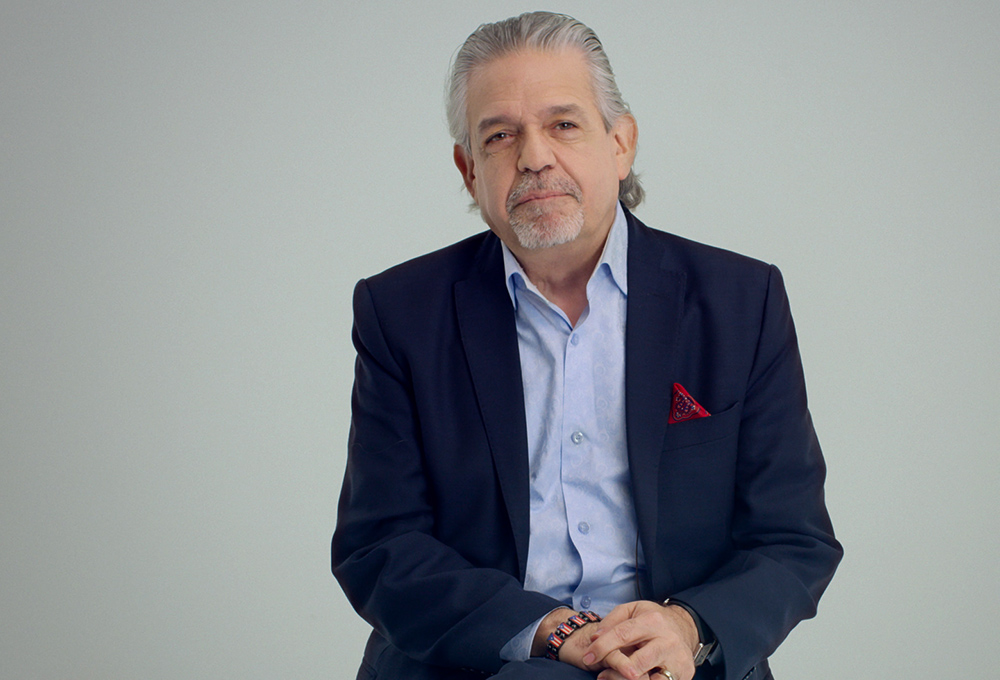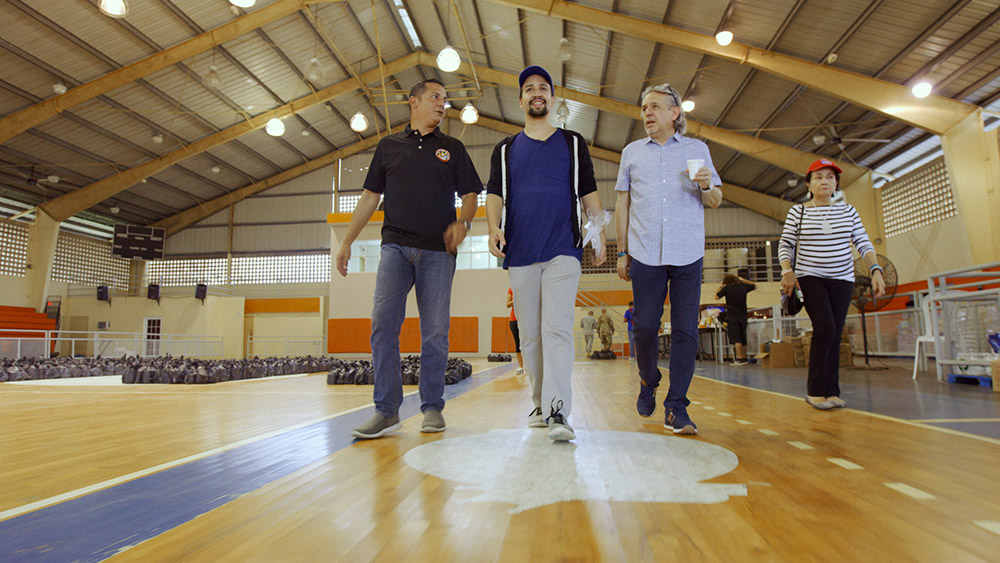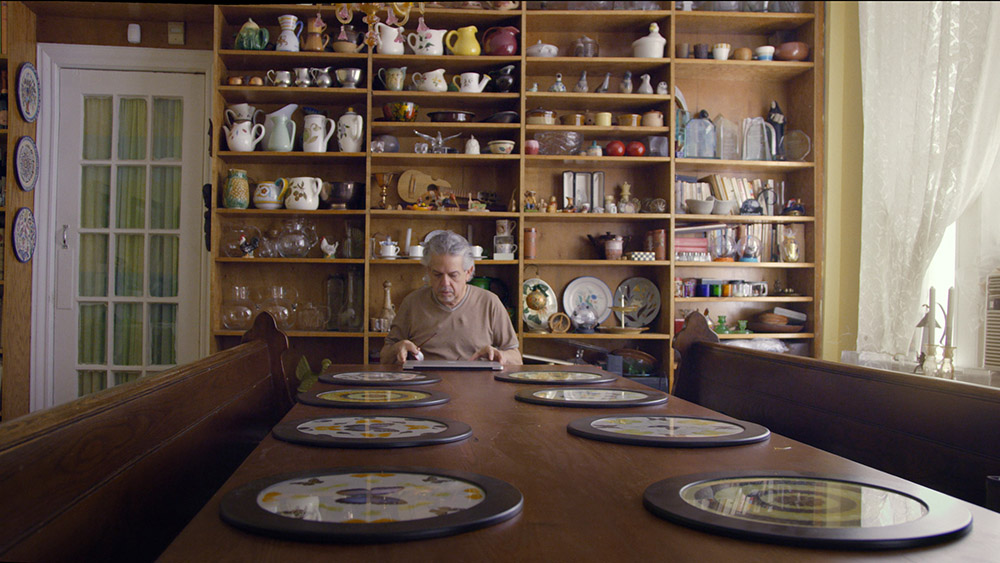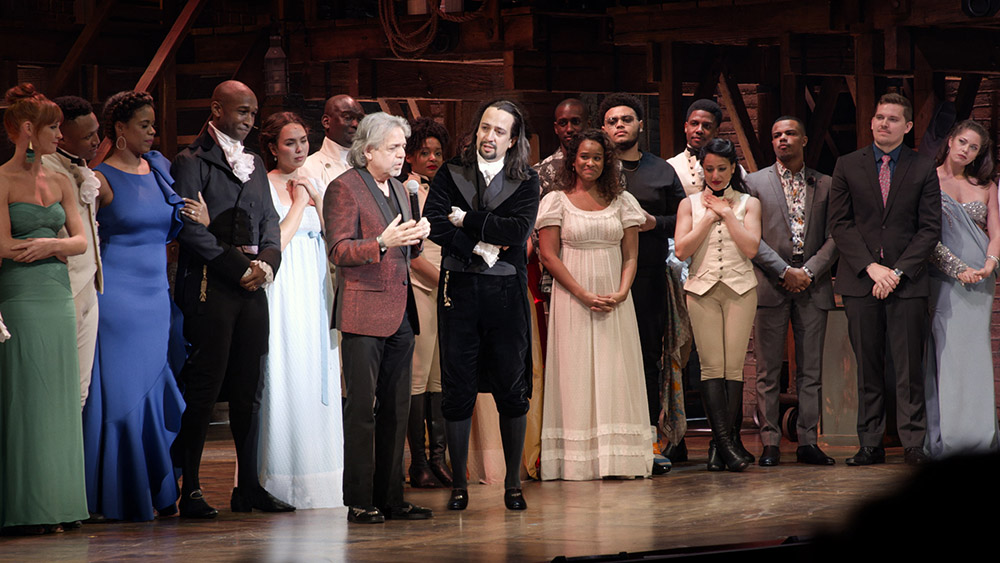
Luis Miranda (Courtesy of HBO)
Lin-Manuel Miranda, creator of the smash hit musical "Hamilton," is practically a household name. And as a theater enthusiast who has long admired his work, I've had a peripheral knowledge of his father, Luis. It's hard to watch any interview with Lin without detecting his father's influence on him and, very often, Luis is seen in the background cheering on his son.
Now, the release of a new HBO documentary, "Siempre, Luis," puts the father center stage.
Long before his son was in the spotlight, Luis Miranda made a name for himself as a fixture in New York's state politics, first cutting his teeth in the 1980s working for Mayor Ed Koch. He has since gone on to advise Sen. Chuck Schumer, Hillary Clinton and a host of other political luminaries.
As the documentary chronicles, Luis has two great loves in life: family and country. And for him, the borders of both should be welcoming and expansive.
"Family could be by blood, by association or by choice," he told me in a recent interview. "It's the group of people that are constantly hugging you, helping you, even when they are critical. I have a sense of being part of something that is much larger than me."
There's a constant optimism in Luis' voice and a cemented smile on his face, and when I ask him about this, he says it's because he believes that most people are fundamentally good.
"Like the COVID vaccine," Luis explains. "Ninety-five percent of people are good. And then there's the 5%." But he doesn't really focus on the 5%, which probably accounts for his almost permanently sunny disposition. "Helping others makes you healthier," he believes.
Except when you're as committed as he is and only sleeping five and a half hours a night, it can nearly kill you. And almost did.
"I am going to use what God gave me to the max," he says in a nod to his Catholic faith.
"If I don't need to sleep one more hour, I won't. I know it's good for your body — believe me — my wife reminds me every morning. I know all of that," Luis insists, arguing that he's got work to do. "We have to fight these nationalistic tendencies that we should not care about our neighbor."
And Luis takes both the fighting and the caring part seriously, having spent much of the last year working tirelessly against President Donald Trump's reelection and trying to unite Hispanics around Joe Biden, while at the same time continuing to raise support for his native Puerto Rico as it recovers from two devastating hurricanes.

Lin-Manuel Miranda (center) with his father, Luis Miranda (right), and mother, Luz Towns-Miranda (far right), assisting with disaster relief efforts in Puerto Rico (Courtesy of HBO)
He also takes that neighbor part seriously. In fact, it's why I reached out to him, since we live a few blocks from each other.
"I'll run into someone on the street," he tells me, "and later my wife will ask me how I know him. And it's because I talk to him all the time at the grocery store or the bodega. I may not even remember his name, but I know all about how his family is doing."
Luis may not be tired, but keeping up with him can be exhausting.
In the new biographical documentary, his son, Lin — whose way with words has earned him a Pulitzer Prize, three Tony Awards, three Grammys, an Emmy, a MacArthur Fellowship and a Kennedy Center Honor — puts it succinctly: "He's just a relentless motherf---er."
Hurricanes and hope
"Siempre, Luis" begins in a doctor's office in 2017, one year after suffering what Luis would describe to Lin as "a little heart attack." His doctors, wife and children have all encouraged him to slow down. Instead, Luis embarks on what he later describes as one of the greatest professional challenges of his life: bringing "Hamilton" to Puerto Rico barely one year after the island was mauled by back-to-back Hurricanes Maria and Irma.
Despite a wave of challenges, including a last-minute change in venue, the show goes on. "Hamilton," which starred Lin in the titular role, went on to raise more than $15 million for arts initiatives in Puerto Rico and, perhaps just as importantly, provided some much-needed hope for the thousands of locals who managed to snag the subsidized tickets (which, fittingly sold for only $10 — the bill, of course, that bears the face of the first U.S. secretary of the treasury, Alexander Hamilton).
Hamilton, born in the West Indies, survived a hurricane and eventually was sent to the United States as a young man by merchants who wanted to fund his education.
"When I was seventeen a hurricane / destroyed my town / I didn't drown / I couldn't seem to die. / I wrote my way out," Hamilton sings in the musical.
Luis Miranda was born in the small town of Vega Alta and left the island at the age of 18 in response to a New York University initiative recruiting Puerto Ricans for its psychology doctoral program.
"He saw a life for himself that was bigger than Puerto Rico," says Lin in the documentary, noting his father was "raised on a steady diet of American bootstrap narratives."
He would soon become one of his own.
At university, Luis met his future wife, Luz, a clinical psychologist who at the time was a single mom. She describes herself in the film as "a package deal" and two months after they married, Luis adopted her daughter and, in 1980, their son, Lin, was born.
Family has always been more than just about blood, according to Luis, and living in Northern Manhattan, he saw an opportunity "to open up the power of government" to the tens of thousands of Puerto Ricans living in the city yet underrepresented in the halls of power.
Luis began as a special adviser for Hispanic affairs to Koch in the 1980s where he learned to both organize and use data to his advantage. A decade later, he founded the Hispanic Federation, a nonprofit organization that would champion the needs of the city's Latinos. New York politicians soon learned they couldn't win without the Latino vote, and most realized that if they were going to have any luck securing it, they couldn't win without Luis.

Luis Miranda (Courtesy of HBO)
"Not everyone wanted us here," Luis says in the documentary, of the Latinos living in New York. Fifty years later, he's an institution.
When Schumer mounted an unlikely congressional run, one of his first decisions was to hire Luis as a political consultant. New York's junior senator, Kirsten Gillibrand, followed the same strategy. In one scene of the documentary, he's warmly embraced by his old friend, Speaker of the House Nancy Pelosi. In another, Hillary Clinton tells him: "You have been going nonstop for so long, Luis."
Puerto Rico: A 'perfect place'
As Luis works his way through the halls of Congress, the streets of Manhattan, and jets back and forth to Puerto Rico, there's tireless movement and chaos in his orbit. The one constant, centering force: his family.
Luis' daughter, Luz Miranda-Crespo, serves as the chief financial officer of the MirRam Group, the political and nonprofit consulting and communications firm he founded with Roberto Ramirez in 2000. Long before "Hamilton," Luis was involved in marketing Lin's theatrical endeavors and connecting him with potential agents and investors.
And for the entire Miranda family, all of their endeavors are intertwined with Luis' beloved homeland 2,600 miles from New York.
In 2015, when Puerto Rico's Gov. Alejandro Padilla announced that the island could no longer pay its debts, much of the world ignored the financial devastation facing the island.
"The Mirandas were really some of the only people paying attention," Eric LeCompte, executive director of Jubilee USA Network, an interfaith advocacy coalition, told me.
Lin took to the pages of The New York Times to issue a plea for help, and both father and son lobbied Congress for emergency debt relief.
"The word 'hero' is appropriate," LeCompte said in describing their efforts. "Luis has a profound sense of justice. Lin grew up seeing his father confront social injustices and it inspired him, and now Lin is following Luis' lead."
"For me, Puerto Rico is this untouchable, perfect place," Luis says through tears in the documentary.
When two hurricanes nearly destroyed the island — and the Trump administration essentially turned a blind eye to an unraveling situation on the ground — the father and son again joined forces.
The younger Miranda wrote a single, "Almost Like Praying," as a love letter to the island, which was recorded by the likes of Gloria Estefan, Jennifer Lopez, Marc Anthony and over a dozen other artists who raised millions for relief. Through the Hispanic Federation, Luis helped coordinate the distribution of the funds directly to the organizations and areas hardest hit.
As the island began to rebuild, the two worked against incredible odds to bring "Hamilton" to Puerto Rico, a project that injected millions into the island's arts efforts and provided a booster shot of hope.
"Both Luis and his son are very conscious of the needs here, and Puerto Ricans are very grateful," Archbishop Roberto González of San Juan told me.
González saw the show during its sold-out run in Puerto Rico ("It's just incredible," he says), but long before Lin-Manuel Miranda was a household name, González first met Luis when he was working for Koch and González was a young priest living in the South Bronx.
"He would always help us out," said González, noting that he would call Luis if the church organized initiatives with Latinos.
Decades later, Luis is still helping out church officials.
In 2016, when New York's Catholic bishops were looking to enhance its communications outreach toward Hispanics, they turned to Luis' firm, the MirRam Group.
"Our bishops don't do a lot of joint efforts but we saw this as a way to build bridges with the Hispanic community, primarily for evangelization," said Dennis Poust, executive director of the New York State Catholic Conference.
The firm helped shape communications on the opioid crisis, the DREAM Act, Farm Laborers Fair Labor Practices Act, and garnered media attention for Holy Week initiatives and events like the feast of Our Lady of Guadalupe.
Advertisement
Poust recalls his first meeting with MirRam, noting that at the time he was working in the role of communications director for the Catholic Conference.
"When you're a comms director and you hear you're going into a meeting with a communications consultant, you're naturally skeptical," he said. "I sat and listened for a long time, and when we left, I said, 'I could have listened to him all day long.' "
Poust said that Luis is "proud of his Catholic faith" and has an "intimate knowledge of the church." He was impressed that he could tell Luis "wanted the job, but he didn't need the job."
Now that four of the state's eight dioceses are in bankruptcy, the Catholic Conference has undergone budget cuts and no longer retains MirRam, but Poust believes Luis still has lessons to offer the church.
"Priests and bishops talk so much about the importance of family, and you don't have a better example than that family," says Poust. When we spoke, Poust told me that he and his wife recently watched "Siempre, Luis," and his takeaway was "that documentary is better than any family life homily you're going to hear in church. It's the real deal."
"He's so family-oriented," Poust continued. "Any father or any son has to envy their relationship. It's so beautiful. As a father of young adults, it moves me to see how much Luis' approval means to Lin-Manuel. It's obvious how much they meant to one another."
"What I took from it was, how can I be a better father?" he said.
Luis' legacy
"What is a legacy?" Hamilton asks in final lyrics of the musical. "It's planting seeds in a garden you never get to see."
Yet at age 66, Luis is feeling fortunate that he's already getting to see many of the seeds he's planted blossom.
"God gave me a gift that I have to exploit. He didn't make me tall and he didn't make me pretty, but he made me smart," he tells me. "And he's allowed me to have contact with people who can effectuate change. And even later on, after 'Hamilton,' he even gave us some wealth. I have to use all of that because when I die, I leave it behind."

Luis Miranda (center left), on stage with his son, Lin-Manuel Miranda (center right), after Hamilton debuted in Puerto Rico (Courtesy of HBO)
One major way he's doing that is through a continued investment in the arts.
"My quest has been to find other Lin-Manuels, and the only way to do that is to invest in the places where the future Lin-Manuels will be attracted to."
"We're going to find them and we're going to support them."
And he's going to continue to build coalitions to care about the causes that are important to him, realizing that it can be a messy, frustrating but ultimately worthwhile process.
"I have learned that I don't have to agree with you 100% of the time. Not even 60% of the time. If I agree with you 51% of the time, let's work together on that 51% that we agree on," he tells me. "Less than that is a little too dicey for me," he adds with a smile. "But I want to find common ground with people."
After all, Luis reminds me, he truly believes 95% of people are fundamentally good.
And after watching "Siempre, Luis" and talking with the man, it occurs to me that what drives Luis is the very reason I reached out to him to begin with: He's my neighbor. And I'm his. Luis has a wide-range vision that recognizes there's a duty to care for those in need and connect with as many people as possible, whether they're next door or an island several thousand miles away. It's a firm belief that we're all neighbors.
"I just feel that I'm so lucky that I'm going to use that luck as much as possible to try and leave my corner of the world better than I found it," he tells me. And fortunately, for all of us, Luis' corner is pretty expansive.








